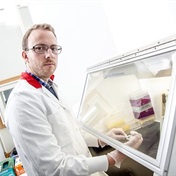"Some of these tests are complete rubbish," warns Dr Howard McLeod, a personalised medicine specialist at the University of North Carolina. "The big challenge for a consumer is figuring out which data is real or not without having to go to medical school."
President George W. Bush is expected soon to sign into law federal protection against genetic discrimination, a bill barring employers and insurers from using test results against patients.
First to benefit will be people who put off learning if they inherited genes responsible for diseases that run in their families - breast cancer, colon cancer, Huntington's, early-age Alzheimer's – for fear of losing insurance coverage or a job.
No one knows how many people that encompasses. The National Institutes of Health estimates 30 percent of potential volunteers for gene studies cite discrimination fears in backing out.
At the same time, US states have adopted a patchwork of protections and steadily growing use of two of the best-proven tests - for the BRCA1 and BRCA2 gene mutations linked to breast and ovarian cancer - suggests that lingering concern hasn't been a huge deterrent for people with strong family histories of disease.
Genetic testing like the 'wild west'
But until now, most genetic testing has been for conditions linked to single genes gone wrong, typically rare ones. That is changing.
Most diseases - including diabetes and the number one killer, heart disease - are caused by complex interactions of multiple genes and environmental factors, such as diet, exercise and smoking.
With scientists rapidly discovering gene variants for these more common conditions, genetic testing in turn is poised to boom. Yet laboratories can market tests for those newly discovered DNA glitches before scientists prove how risky they are, or whether knowing you have one will make any difference in your health care.
Nor are lab tests subject to the same scrutiny as medical treatments. So while the pace of discoveries makes for a thrilling time, genetic testing in some ways is science's Wild West - with more than 1 200 different genetic tests available but only a fraction accepted by mainstream medical groups, McLeod notes.
Test only good if it changes your behaviour
Just last week, US government health advisers called for more oversight of genetic testing, citing 'significant gaps' in validating the tests' usefulness, especially those sold directly to consumers.
Specialists advise anyone considering a gene test to:
- Consult a doctor or one of the nation's 3 000 genetic counsellors to weigh pros and cons
- Ask what the results will mean for siblings or children. How big is their risk, and do they want to know?
- Ask how accurate the test is, and if knowing you've got a risky gene allows you to take steps for better health or just worry.
"It's not of value unless you're going to do something to modify your health behaviour," cautions Angela Trepanier of Wayne State University, president of the National Society of Genetic Counsellors.
How testing helped three sisters
Stephanie Cone illustrates the power of gene testing done right. She and her two sisters considered testing for about a decade as their mother beat back four cancer bouts - ovarian, colorectal and two separate breast cancers. Years before their gene test, Cone and one sister had their ovaries removed. "The family history was clear," Cone says: A grandmother and
great-grandmother had both died of ovarian cancer.
But with each of their mother's diagnoses, the sisters wondered if knowing the precise genetic risk might give them more ammunition, and help their own daughters later. A genetic counsellor laid out possible scenarios: How would they feel if one sister escaped the gene risk? Would gene carriers get extra breast checks or choose breast removal?
Finally they took the plunge. All three shared their mother's BRCA1 mutation. That meant the final sister to get a hysterectomy also got extra testing that uncovered early-stage ovarian cancer, so she could undergo chemotherapy. And last December, all three sisters checked into the hospital for simultaneous mastectomies.
"I say to my kids all the time, 'We're not afraid of cancer here," says Cone, whose 16-year-old daughter already says she'll be tested once she is old enough.
Conversely, not finding one particular gene for, say, breast cancer or diabetes doesn't mean you are off the hook for standard checkups; other genes could still sicken. – (Lauran Neergaard/ Sapa)
May 2008
Read more:
Some genetic tests waste of money
Helpline on genetic tests




 Publications
Publications
 Partners
Partners










